Happy Friday! We’ve seen a number of headlines trying to evoke sympathy for the poor Washington state woman who called the police after 100 “aggressive” raccoons showed up at her house.
We’re frankly more interested to know what she thought would happen after 35 years of feeding trash pandas. “The normal raccoons that she feeds are nice,” the local sheriff’s department said, “but the new ones showing up scare her.”
Quick Hits: Today’s Top Stories
- The Bureau of Labor Statistics reported Thursday that the Consumer Price Index (CPI) rose 0.2 percent month-over-month—matching the monthly increases recorded in the last two CPI reports—and 2.4 percent annually in September. Annual CPI, which fell by 0.1 percent from last month’s report, is at its lowest since February 2021, though both the annual and month-over-month figures were slightly higher than forecasters’ projections. Core CPI, stripped of the more volatile food and energy prices, rose 0.3 percent month-over-month and 3.3 percent since September 2023.
- The United Nations Interim Force in Lebanon (UNIFIL) said Thursday that two U.N. employees were injured after an Israel Defense Forces (IDF) tank allegedly attacked a UNIFIL observation tower in southern Lebanon. At a nearby UNIFIL site, the agency claimed that Israeli soldiers had fired on a bunker sheltering U.N. employees, also damaging vehicles and communication systems equipment. The IDF confirmed its forces operated near a UNIFIL site in the region and had told U.N. employees to stay in “protected areas” prior to opening fire. “Hezbollah operates from within and near civilian areas in southern Lebanon, including areas near UNIFIL posts,” the IDF added.
- Swedish law enforcement officials on Thursday reported a shooting at an “Israeli object,” identified by Swedish national broadcasting as an office of Elbit Systems, an Israel-based defense firm, in Gothenburg, Sweden. No injuries were reported, and local police added they detained a “young” suspect—potentially a teenager or younger—in connection to the attack.
- The Israeli government’s security cabinet met Thursday to plan the country’s response to Iran’s missile assault against Israel earlier this month, though multiple outlets reported that the cabinet gave Israeli Prime Minister Benjamin Netanyahu and Defense Minister Yoav Gallant the authorization to decide the ultimate counterattack at their discretion. The meeting comes one day after Netanyahu spoke on the phone with President Joe Biden—potentially for the first time in more than a month. Though little is publicly known about U.S. support for Israel’s planned retaliation against Iran, Biden reaffirmed Israel’s right to defend itself against Hezbollah, the Iranian-backed terrorist group in Lebanon, according to a White House statement.
- The Swedish Academy on Thursday awarded South Korean author Han Kang the Nobel Prize in Literature. Kang—the first South Korean recipient of the prestigious literary award—is best known for her novel The Vegetarian and was honored for her “intense poetic prose that confronts historical traumas and exposes the fragility of human life.”
- Ethel Kennedy, widow of Democratic attorney general and New York Sen. Robert F. Kennedy, passed away Thursday morning at the age of 96. She died of complications from a stroke, her grandson, former Rep. Joe Kennedy III of Massachusetts, announced on social media. Ethel Kennedy, a 2014 Presidential Medal of Freedom recipient, founded the non-profit RFK Center for Justice and Human Rights following her husband’s assassination in 1968.
- Spanish pro tennis superstar Rafael Nadal announced Thursday he would retire from the sport after 23 years, following the Davis Cup team tournament in November. The 38-year-old was the Association of Tennis Professionals’ top player of the year five times and won 22 Grand Slam singles titles but has struggled with injuries in recent years. “I think it’s the appropriate time to put an end to a career that has been long and much more successful than I could have ever imagined,” Nadal said in a video message.
Florida Avoids the ‘Worst-Case Scenario’
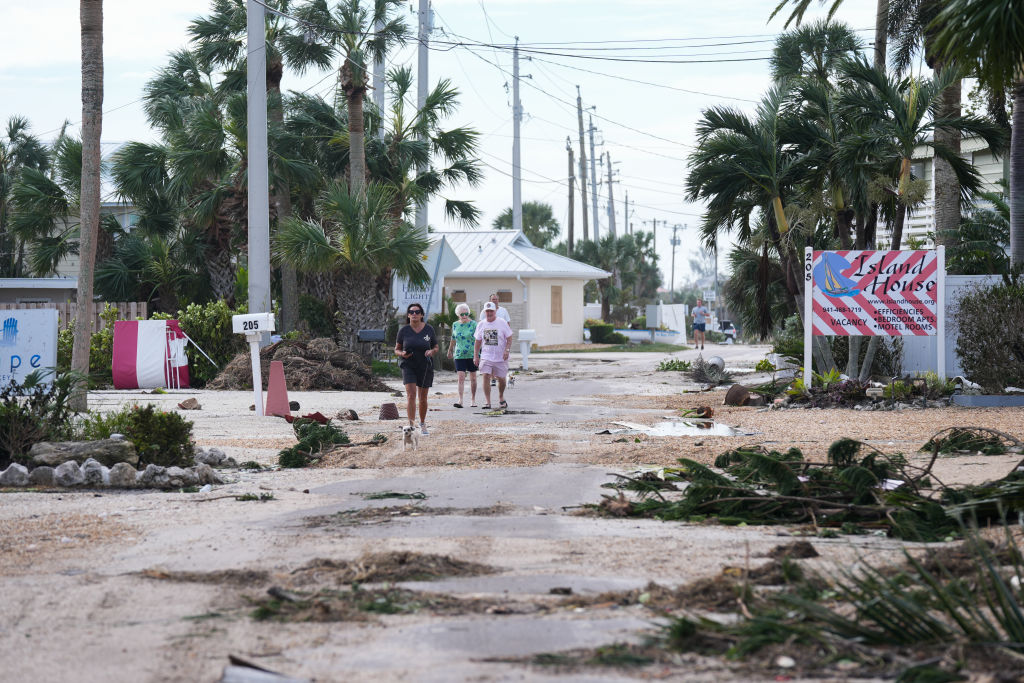
As Miami meteorologist John Morales described on air how Hurricane Milton had exploded from a tropical storm to a Category 5 hurricane—the strongest on the scale—he suddenly got choked up.
“I apologize,” he said, trying to regain his composure. “This is just horrific.”
Milton’s wind speeds had more than doubled in just 48 hours by Tuesday morning as it churned off the northern coast of the Yucatán Peninsula, gathering steam in the extremely hot water of the Gulf of Mexico as it headed straight for Florida’s western Gulf Coast. The threshold to become a Category 5 storm is sustained wind speeds of 157 miles per hour—which Milton was far exceeding at points.*
Milton made landfall in Florida south of Tampa on Wednesday night as a still-deadly Category 3 hurricane, battering the state with hurricane-force wind and rain—plus powerful tornadoes before it had even made it ashore. Though Gov. Ron DeSantis said Thursday his state had avoided the “worst-case scenario,” Florida now shifts into recovery mode after the second hurricane in as many weeks as political back-and-forth and misinformation continue to swirl.
With the devastation of Helene across lower Appalachia dominating the headlines, the days before Milton made landfall were charged. The storm seemed poised to hit Tampa, the first time the city had been in the direct path of a storm in roughly a century. More than a dozen Florida counties were under mandatory evacuation orders, covering roughly six million people. “Helene was a wake-up call, this is literally catastrophic and I can say without any dramatization whatsoever: If you choose to stay in one of those evacuation areas, you are going to die,” Tampa Mayor Jane Castor said on CNN on Monday.
Helene—in addition to being a warning for Floridians—complicated the preparations for Milton. Debris from the first round was still littered across Florida earlier this week, poised to become dangerous projectiles in another storm. “So in a little over 48 hours, and they were working all through, through the night, in the wee hours of the morning in [counties] like Manatee, Sarasota, and Pinellas, they were able to remove 55,000 cubic yards of debris,” Gov. Ron DeSantis said Tuesday. “So that’s over 3,000 truckloads of debris.”
President Joe Biden canceled a foreign trip scheduled for late this week and approved federal emergency declarations for the state ahead of the storm. He said Wednesday that he’d prepositioned federal disaster recovery resources, including U.S. military assets and 1,000 members of the Coast Guard, to respond after the hurricane made landfall.
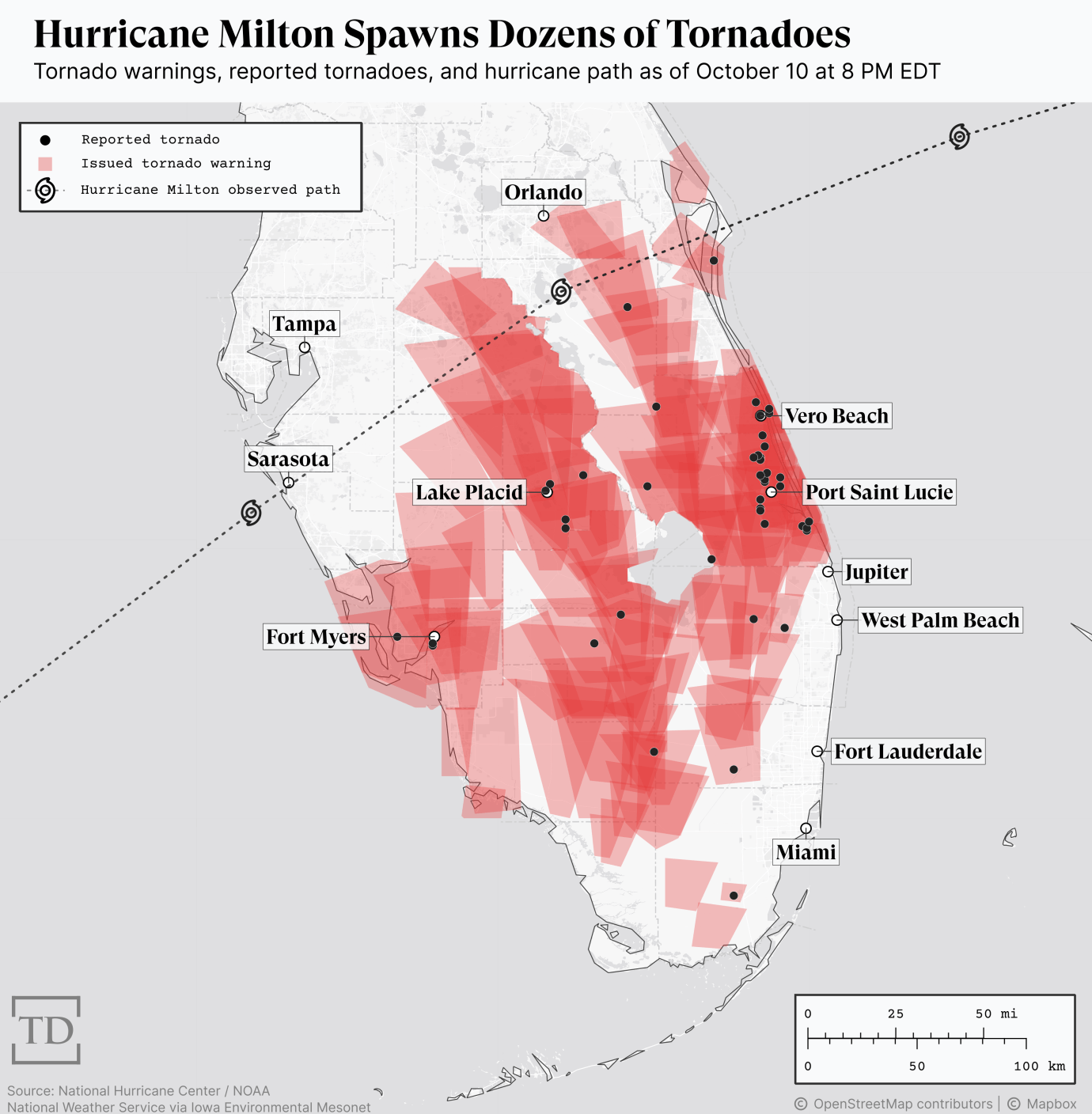
But the impacts of the storm were being felt even before. On Wednesday, as the first of Milton’s bands swept across the state, a rash of tornadoes touched down throughout southern Florida. The twisters were particularly fierce to be associated with a hurricane, which usually only generates short-lived tornadoes. At least four people were killed in St. Lucie County on Florida’s Atlantic coast on Wednesday, including several who died after a tornado tore through a retirement community.
As the storm approached, it bounced between a Category 4 and 5 categorization before finally making landfall as a weakened Category 3 hurricane—a similar trajectory to Hurricane Katrina in 2005. The key question as the storm approached was whether it would shift south of Tampa and spare the city a direct hit. And, indeed, it did, coming ashore near Sarasota at Siesta Key, a barrier island in the Gulf of Mexico.
Though meteorologists warned of significant storm surge—perhaps as much as 10 or 15 feet—in and around Tampa Bay associated with Milton’s arrival, in fact, the opposite was true: The storm sucked the water out of the bay and into the gulf on approach, a bizarre phenomenon that’s most common on the left side of a hurricane, and Tampa was ultimately spared the worst of the storm surge.
But just because the storm had weakened and avoided Tampa didn’t mean it didn’t do serious damage. As it swept across the Florida peninsula on Wednesday night and Thursday morning, further weakening into a Category 1 storm, Milton dumped nearly 2 feet of rain in some areas on its northern flank, bringing flooding. Rivers, creeks, and canals flooded their banks, and high winds—much more than 100 miles an hour in many areas—destroyed homes and tossed boats, cars, trees, and debris far afield.
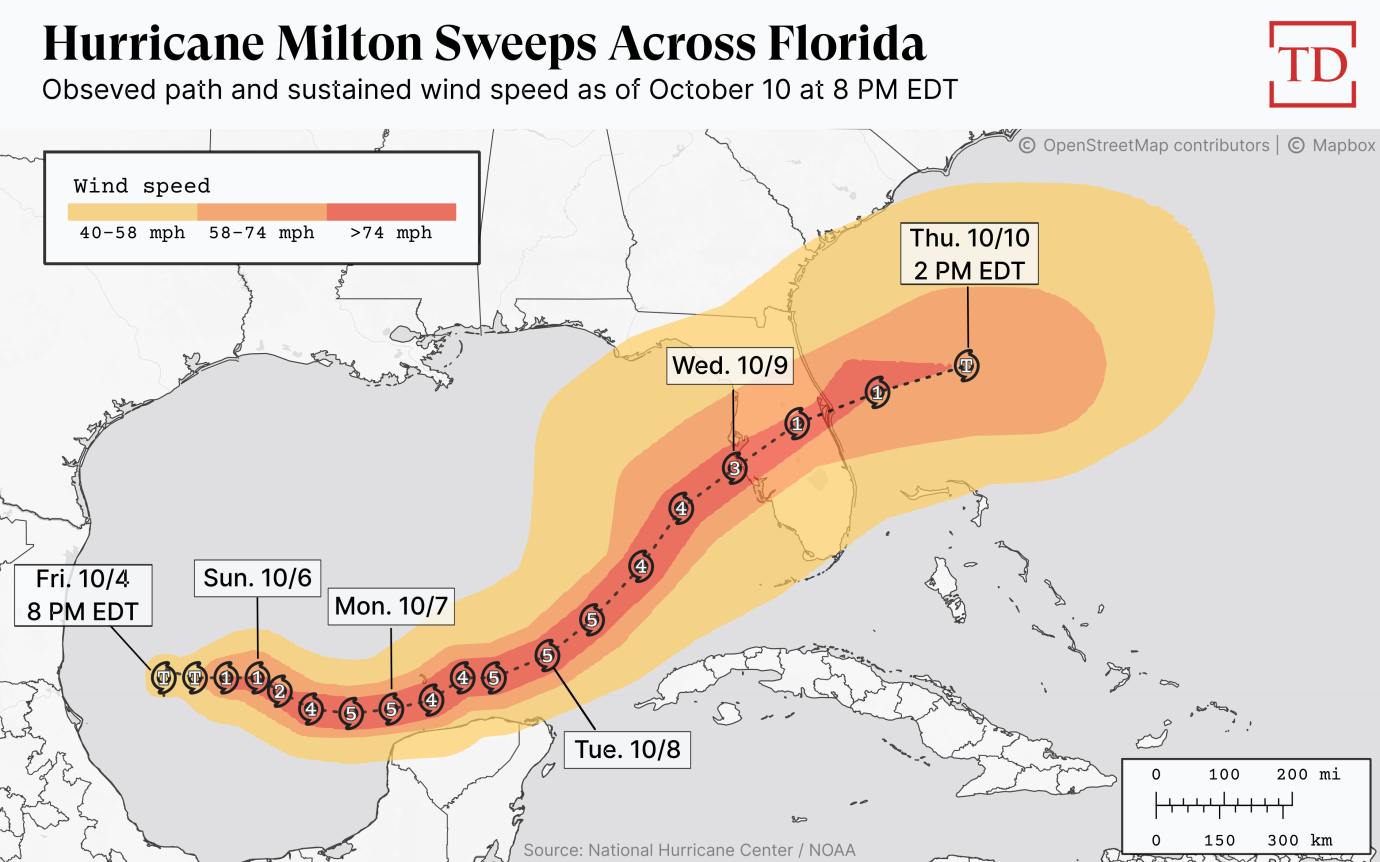
More than 3 million customers were without power in Florida as of Thursday evening. “I think this is probably similar to hurricanes Irma and Ian in terms of the number of outages,” DeSantis said Thursday—Hurricane Irma was a Category 4 and Hurricane Ian a Category 5 when they made landfall in Florida in 2017 and 2022, respectively. With linemen still working in North Carolina and Tennessee to restore power there after Hurricane Helene, DeSantis added, “We’ve brought them in from as far away as California.” Some 50,000 linemen were prepositioned to repair downed power lines.
In St. Petersburg, the wind threw a crane onto a building that houses the Tampa Bay Times, cutting a gash through several floors of the downtown high-rise. The Florida Division of Emergency Management, the state’s disaster relief agency, had originally intended Tropicana Field—home of the Tampa Bay Rays located near downtown St. Pete—to be a staging area for first responders after the hurricane made landfall. Milton tore the roof off the stadium, though it was built to withstand winds of up to 115 miles per hour.
There were no injuries reported in association with the crane’s collapse or the damage to Tropicana Field, but two people reportedly died in St. Petersburg as a result of the storm. So far, there are 13 storm-related deaths, including those in the tornadoes Milton spawned.
Still, the storm could have been much worse, DeSantis said Thursday. “My sense is we’ll probably be able to release a lot of the search-and-rescue resources we’ve had on hand very soon,” he said.
The Federal Emergency Management Administration—about which plenty of wild conspiracies were promulgated in the aftermath of Hurricane Helene—was facing staffing shortages, particularly those who deploy first after a disaster, though both the Federal Emergency Management Agency (FEMA) head Deanna Criswell and Alejandro Mayorkas—the secretary of the Department of Homeland Security, in which FEMA is housed—said the agency had the resources to deal with Milton. FEMA is also facing potential funding shortfalls: The agency has already spent nearly half of the disaster relief money Congress appropriated for fiscal year 2025, which started 11 days ago. If that fund becomes exhausted—hurricane season isn’t over until November, among other possible natural disasters—the agency would cut off rebuilding projects to hold money back for future emergency relief during the year. Those restrictions could begin even before December.
House Speaker Mike Johnson has resisted calls to reconvene Congress during the campaign season to appropriate additional funding to the agency, saying to do so now would be “premature” before the extent of Milton’s damage is known. “So it’s going to take them a number of weeks to be able to fully even access those areas, to then assess the damage levels,” he said Thursday. “When they get the numbers and when they send, the Congress will act immediately.”
Like Hurricane Helene, Milton brought with it ugly politics and bizarre disinformation. Earlier this week, NBC News reported that DeSantis was “dodging” Vice President Kamala Harris’ phone calls in the aftermath of Hurricane Helene, according to an unnamed DeSantis aide. DeSantis himself denied he’d been avoiding the Democratic presidential nominee’s calls; Harris called him “selfish” and accused him of engaging in “political gamesmanship” in a time of crisis.
But the spat was nothing compared to the wild conspiracy theory being pushed by a sitting member of Congress: that the federal government could control the weather. X is awash with such nutty claims, including some—like GOP Rep. Marjorie Taylor Greene’s—that point to the National Oceanic and Atmospheric Administration’s (NOAA) website, where it explains its efforts to engage in things like cloud seeding. That is, um, quite obviously different than creating a hurricane out of whole cloth and deciding where it will go. “Loony tunes,” one Republican representative told Axios of Greene’s claims.
DeSantis condemned the conspiracy theories about weather control on Thursday—and took a swipe at the idea that climate change prompted by human behavior was causing particularly strong storms. “If I could control the weather, I would do 78 [degrees] and sunny year-round,” he said Thursday. “This is on both sides. You kind of have some people think government can do this, and others think it’s all because of fossil fuels.”
Ultimately, though, after two weeks of devastating weather, there was relief. “The storm was significant, but thankfully,” he said, “this was not the worst-case scenario.”
Worth Your Time
- For the New York Times, W.J. Hennigan explored how the U.S. is upgrading its nuclear arsenal. “The industry is struggling to find the tens of thousands of new workers it needs,” Hennigan wrote. “For the past 18 months, the company has traveled to elementary schools across New England to educate children in the basics of submarine manufacturing and perhaps inspire a student or two to consider one day joining its shipyards. The coursework—on this particular day, welding crackers together with Easy Cheese to create mini-submarines—is one small facet of the much bigger preparations America is making for a historic struggle with its nuclear rivals. … The portrait that emerged is a country that is being transformed — physically, financially and philosophically — by an unprecedented wave of nuclear revitalization. The effort is as flush with cash as it is rife with problems and delays: At least 20 major projects are already years behind schedule and billions of dollars over budget.”
- On his podcast “Question Everything,” Brian Reed spoke to a married couple divided by the news they consumed. “There was no give and take,” Emily said of her marriage with Dick following the 2020 election. “We can argue about, you know, what we’re going to spend our money on and we can argue about our kids, you know, we can argue about the neighborhood, but we usually come to some sort of resolution. This whole thing about Trump[‘s 2020 false election claims], there is no resolution.” But then the couple was introduced to Isaac Saul’s daily political newsletter, Tangle. “He was very clear about what his biases were—that made him extremely trustworthy,” she said. And that trust proved to be key: “They started realizing that they actually agreed with each other on a lot of things, and were able to talk about it,” Reed observed. “And eventually, something pretty remarkable happened. … [Tangle proved] to [Dick] that the 2020 election had not been stolen.” When asked why, Dick answered, “It’s only because I trust Isaac Saul so much.”
Presented Without Comment
Axios: Scoop: Some Top Dems Won’t Commit to Certifying a Trump Win
Rep. Jan Schakowsky (D-Ill.), a senior chief deputy whip who voted to object to George W. Bush electors in 2005, said of Trump, “I don’t know what kind of shenanigans he is planning,” adding: “We would have to, in any election … make sure that all the rules have been followed.”
Schakowsky later said in a statement that she was “proud to … join all my Democratic colleagues in certifying the 2020 election” and looks forward to “doing the same in January 2025.”
Also Presented Without Comment
Writer Ta-Nehisi Coates on what he would do in a hypothetical October 7 scenario:
One of the things I’ve really tried to maintain both personally, and in my public presentation, is obviously my great horror at—maybe not obviously—at October 7. The fact that I don’t say that perfunctorily, but I say it because at the core of my politics is human life. … Were I 20 years old, born into Gaza, which is a giant, open-air jail … and I grow up under that oppression and that poverty, and the wall comes down: Am I also strong enough or even constructed in such a way where I say, “this is too far”? I don’t know that I am.
In the Zeitgeist
The album cover on the new Dawes album out today looks a little bit like a page in one of those old I Spy books, and it … kind of sounds like it too: A very pleasant jumble.
Toeing the Company Line
- In the newsletters: The Dispatch Politics team covered Trump’s about-face on early voting, Scott used (🔒) the Buc-ee’s gas station chain to explain why longshoremen’s fear of automation is misplaced, and Nick explained (🔒) why he’s bearish on the “Republicans for Harris” vote.
- On the podcasts: Sarah is joined by Kevin and Steve on The Dispatch Podcast roundtable to discuss hurricanes, the politics of the response to natural disasters, and whether CBS is worth your time.
- On the site: Kevin argues Harris and Trump are both misguided in their goals for U.S. manufacturing, and Stacy Willett explains FEMA’s response to natural disasters.
Let Us Know
Were you or your loved ones affected by Hurricane Milton?
Correction, October 11, 2024: This newsletter originally identified winds of 175 miles per hour as the threshold for a Category 5 storm. The threshold is 157 miles per hour.




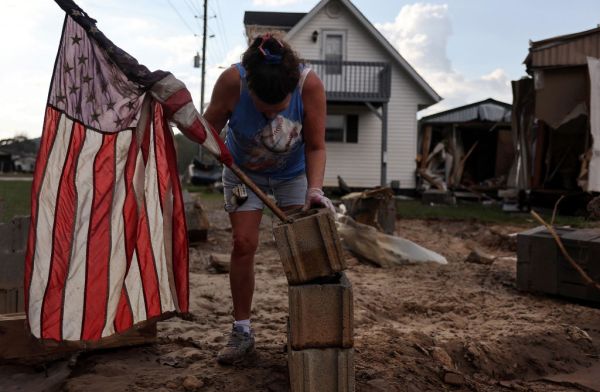
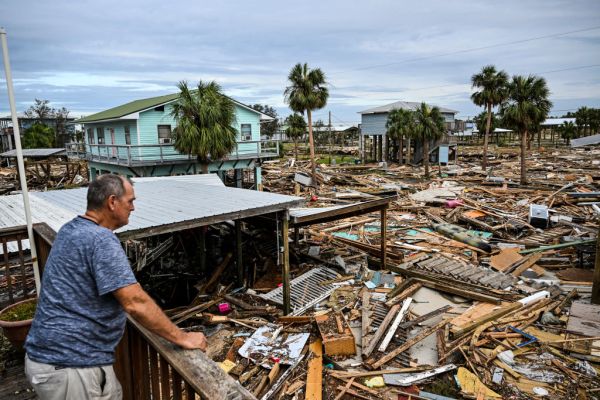






Please note that we at The Dispatch hold ourselves, our work, and our commenters to a higher standard than other places on the internet. We welcome comments that foster genuine debate or discussion—including comments critical of us or our work—but responses that include ad hominem attacks on fellow Dispatch members or are intended to stoke fear and anger may be moderated.
With your membership, you only have the ability to comment on The Morning Dispatch articles. Consider upgrading to join the conversation everywhere.